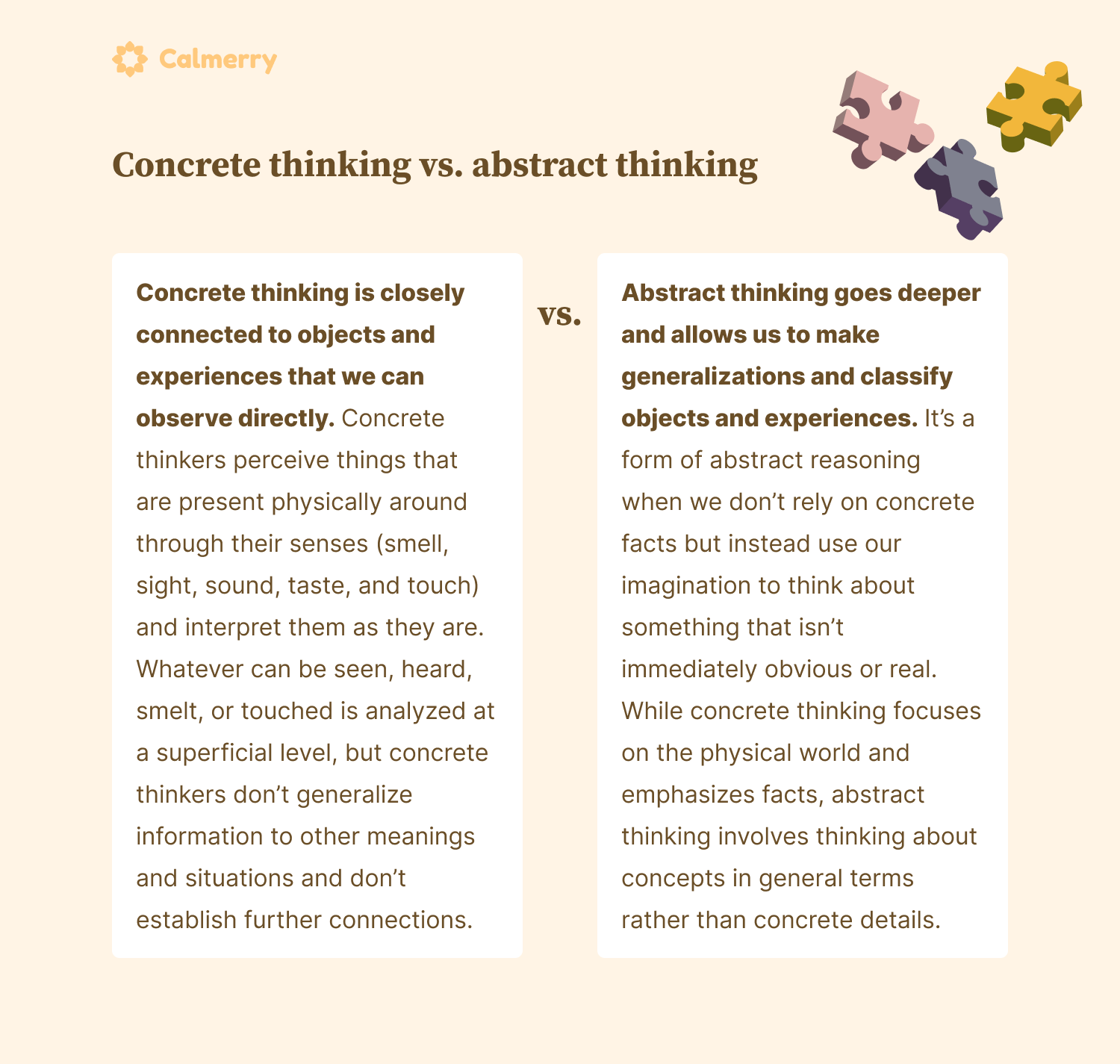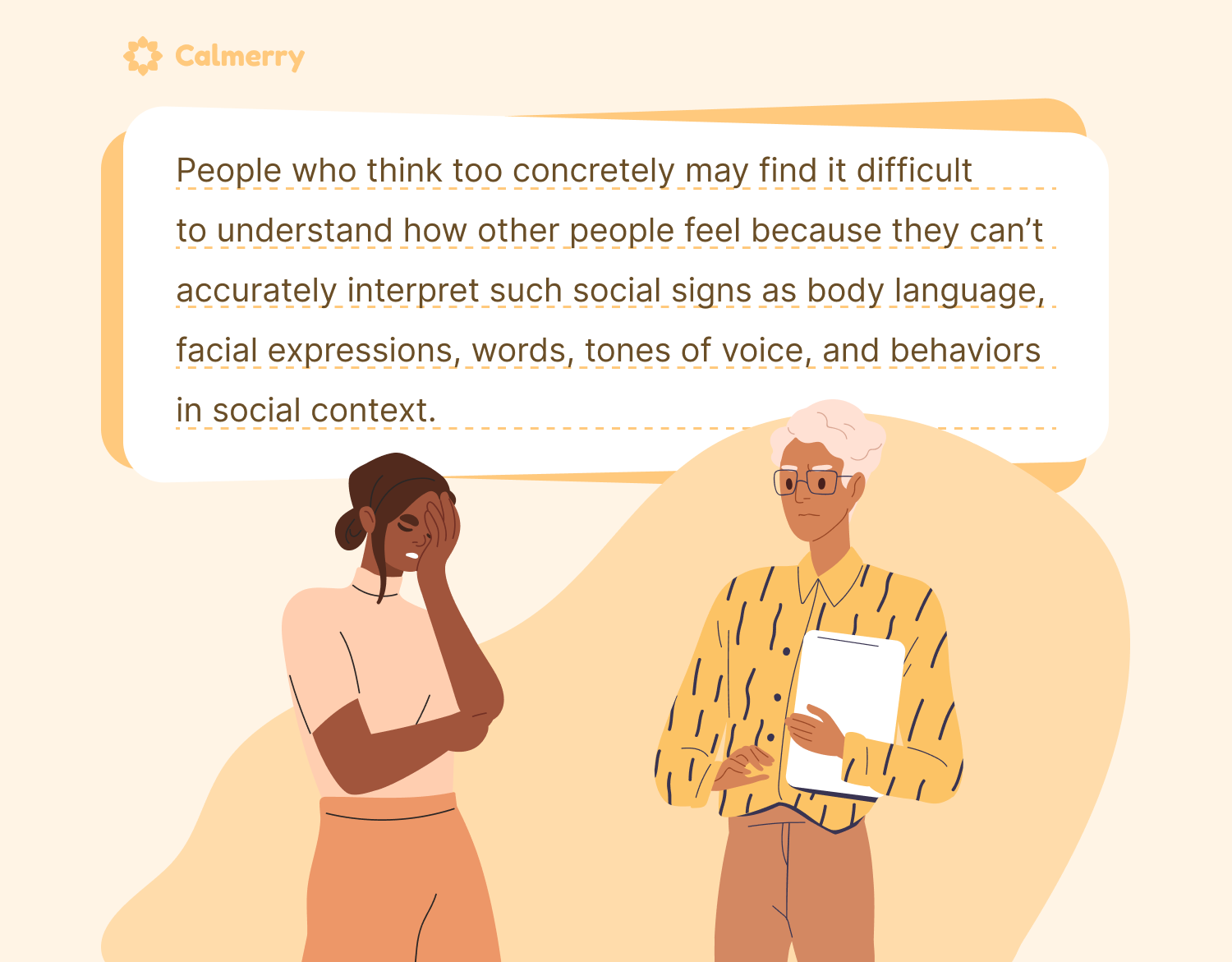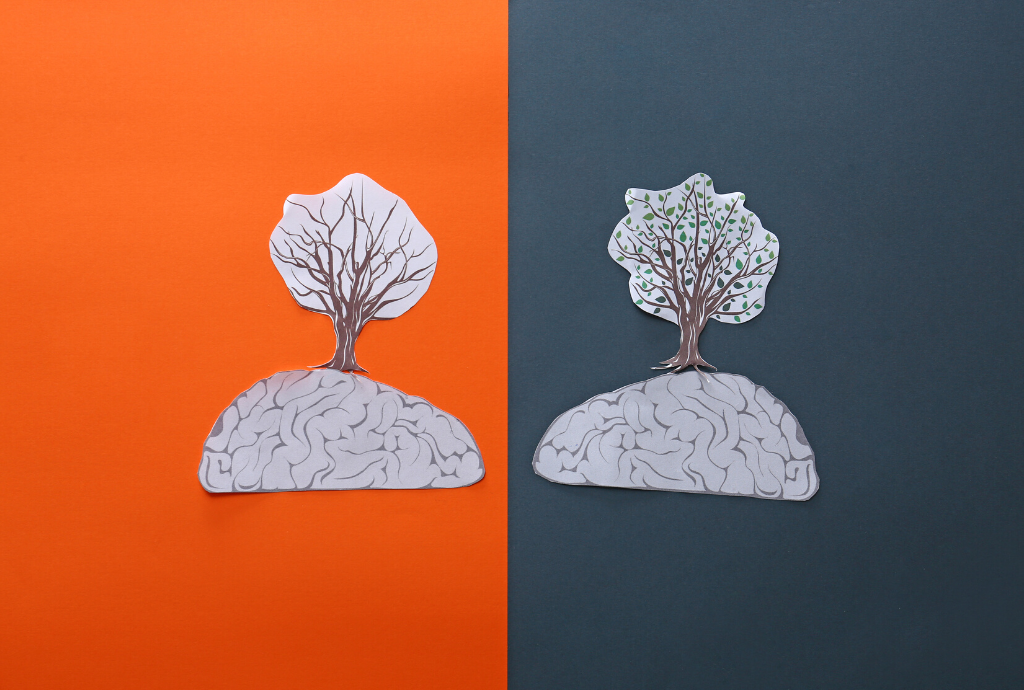The Development of Concrete and Abstract Thinking Patterns

In this article
Thinking is cognitive activity when we consciously use our brains to make sense of the world around us and choose how to respond to it. We develop our ability to think at an early age, so we often take it for granted, but it’s a very complex process that makes us what we are.
Young children tend to think of their world in concrete ways, learning facts about objects they have encountered and their own experiences. But as they grow and mature, children develop abstract thinking patterns that allow them to see a bigger picture, think beyond just the “here and now,” and reflect on events and ideas.
Fully grown-up adults can adopt their styles of thinking according to the demands of the environment, depending on the situations and contexts, although some people may have difficulty with abstract thinking. So here, we’ll talk about the difference between abstract vs. concrete thinking and provide you with some tips on how to develop abstract reasoning skills.
What is abstract thinking?
Abstract thinking can be defined as the ability to think about complex concepts and ideas without being tied to specific examples, experiences, situations, objects, and people. It is considered a type of high-order thinking because it’s more complicated than other styles of thinking that are centered around real-life facts and information based on data.
Abstract thinking allows us to absorb information from our senses, process it, and connect it to a wider world. As a result, abstract thinkers can reflect on events and ideas as well as attributes and relationships separate from the real-life objects that share those relationships or have those attributes.
Abstract thinking also allows us to exercise creativity, think critically, and solve problems in unique ways even if there isn’t enough existing knowledge. Examples of abstract thinking include using humor in conversations, being hopeful in tough situations, recognizing that the value of things is defined by what we place on them, etc.
We use abstract thinking in different aspects of our daily lives, for example, when we:
- Describe something using metaphor or analogy
- Analyze situations and come up with creative solutions
- Notice patterns and relationships between objects, events, and processes
- Continue to explore options in a situation after we have found a resolution
- Consider someone else’s point of view
- Predict something based on available information and our thoughts
Abstract thinking vs. concrete thinking
Abstract thinking and concrete thinking are opposite approaches. Concrete thinking is closely connected to objects and experiences that we can observe directly. Concrete thinkers perceive things that are present physically around them through their senses (smell, sight, sound, taste, and touch) and interpret them as they are. Whatever can be seen, heard, smelt, or touched is analyzed at a superficial level, but concrete thinkers don’t generalize information to other meanings and situations and don’t establish further connections.
Abstract thinking goes deeper and allows us to make generalizations and classify objects and experiences. It’s a form of abstract reasoning when we don’t rely on concrete facts but instead use our imagination to think about something that isn’t immediately obvious or real. While concrete thinking focuses on the physical world and emphasizes facts, abstract thinking involves thinking about concepts in general terms rather than concrete details.

How do we develop abstract thinking?
Abstract thinking isn’t something that we’re born with – abstract thinking skills are an important part of cognitive development in childhood. The Swiss developmental psychologist Jean Piaget explained how children’s thinking abilities change as they get older and outlined this process from birth to early adulthood. He described four distinct stages of cognitive development:
- Sensorimotor stage is an early period when children are gaining information from their senses (touching, grasping, watching, and listening) and exploring the world using their motor skills. This is often why you see babies putting everything they can grab in their mouth! They aren’t able to think further than what is in front of them, though they do start to understand object permanence. Those things are still there even when they can no longer see them.
- Preoperational stage (from ages 2 to 7) is the time when children develop the ability to think symbolically. They learn that such symbols as pictures, sounds, and letters can represent the objects in the real world. This is often where you see engagement in pretend play, imitation of others, mental imagery (such as creating an imaginary friend), and drawing pictures that represent past and future events. This is the beginning of when the capability for abstract thinking starts to develop though is likely not expressed. Kids at this stage believe that other people see things the same way as they do.
- Concrete operational stage (from age 7 until around 11), children become more logical, but their thinking still remains tied to what they directly observe. Kids also begin to realize that not everyone sees the world the same as them, and are open to new ideas and problem-solving. This is the stage where they realize that water can turn to ice and then back to water as well as begin sorting and organizing objects by color or type.
- Formal operational stage begins at age 11 and continues into adulthood. Children improve their ability to reason about concrete information and begin to think abstractly. They become more skilled at thinking about something from the perspective of another person and grow their ability to empathize. Kids also develop skills to mentally manipulate abstract ideas and notice certain patterns and relationships between abstract concepts. This is where they can start to think of different theories or entertain thoughts of “what if.”
Conditions that impact abstract thinking
Abstract thinking is a vital skill, but it can be challenging for some. So why can’t some people think abstractly? There are some disorders and mental health conditions that may limit abstract reasoning, including:
- Autism spectrum disorder
- Learning disabilities
- Schizophrenia
- Dementia
- Traumatic brain injury (TBI)
The natural aging process can also impact abstract thinking abilities, especially those associated with fluid intelligence, which can be defined as the ability to solve problems in unique ways. Research suggests that skills associated with fluid intelligence reach their peak around the ages of 30 or 40 and tend to decline as people reach later adulthood.

People who think too concretely may find it difficult to understand how other people feel because they can’t accurately interpret such social signs as body language, facial expressions, words, tones of voice, and behaviors in a social context. Sometimes, concrete thinkers stick to literal interpretations of phrases and figurative expressions and use rigid behaviors, and which may cause conflicts with other people. Concrete thinkers may also have difficulties with problem-solving, imagination, and creating things.
How to communicate with a concrete thinker
If some people in your life have a condition that makes them prone to concrete thinking, you can use these tips to communicate with them more effectively:
- Always be as specific as possible and look for opportunities to present facts
- Avoid using metaphors, analogies, and idioms
- Use illustrations and photos when you explain something
- Limit sarcasm and jokes because they often rely on abstract ideas and plays on words
- Anticipate that a concrete thinker might compare, contract, and categorize things in concrete ways
Can abstract thinking not be helpful?
People with strong abstract thinking skills tend to score well on IQ tests and excel in areas that require creativity, such as art, writing, and other related areas. But you should remember that in some cases, the ability to make connections, predict, and imagine can lead to problems.
For example, a cognitive distortion known as catastrophizing, when people habitually imagine the worst possible potential outcomes, can cause feelings of fear and anxiety or worsen depression symptoms.
Research has also shown that abstract thinking is sometimes associated with rumination. This thinking style can occasionally become problematic for people with such mental health conditions as depression, anxiety, and post-traumatic stress disorder (PTSD).
The good news is that researchers have found it can be helpful to practice concrete thinking skills and use them to improve symptoms of depression because it can stop people from overgeneralizing. Training people to think concretely about traumatic experiences has been shown to help trauma survivors build resilience and decrease the number of intrusive memories.
On the flip side, those that are good at abstract thinking can learn how to use it to combat these symptoms in conjunction with the concrete thinking skills mentioned above. By focusing on building mindfulness as to when they are ruminating, this allows for an opportunity to catch these thoughts when they are happening and then, with the guidance of a text therapist, use abstract skills to shift and engage in using their imagination to envision coping effectively with challenges in their life.
How to improve abstract thinking skills
Abstract thinking is a skill that you can learn and improve through active practice. This can be done in a number of ways:
- Solving puzzles, optical illusions, crosswords, and other brain teasers will help you learn to view information from different perspectives and angles and improve problem-solving and critical thinking skills.
- You can also play with figurative language and write metaphors, similes, analogies, and pieces of personification.
- Try to expose yourself to completely new experiences and ideas regularly. For example, learning about new cultures will allow you to get rid of biases and prejudice, think more freely, and minimize stereotypes.
- Seek a few efficient solutions to a single problem. Think out of the box, and don’t be afraid to come out of your comfort zone and experiment with your ideas.
Bottom line
Abstract thinking and concrete thinking are two types of thought processes. Concrete thinking focuses on things that are real and tangible, while abstract thinking is a higher-level mode of thinking that involves processing theoretical concepts and allows us to make connections and see patterns. It’s important to remember that you need both concrete and abstract thinking skills to solve problems and maintain good mental health. At Calmerry, we understand the significance of this balance and offer support to help you nurture these essential cognitive skills.
online therapy
live video session


